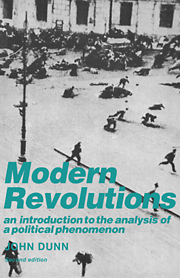Book contents
- Frontmatter
- Contents
- Preface to the first edition
- Introduction to the second edition
- Introduction: the ideological dilemmas of moden revolution and its analysts
- 1 Russia
- 2 Mexico
- 3 China
- 4 Yugoslavia
- 5 Vietnam
- 6 Algeria
- 7 Turkey
- 8 Cuba
- Conclusion: approaches to the ideological assessment and causal explanation of modern revolutions
- Notes
- Bibliography: guide to further reading
- Supplementary reading, 1971–88
- Index
Introduction to the second edition
Published online by Cambridge University Press: 05 June 2012
- Frontmatter
- Contents
- Preface to the first edition
- Introduction to the second edition
- Introduction: the ideological dilemmas of moden revolution and its analysts
- 1 Russia
- 2 Mexico
- 3 China
- 4 Yugoslavia
- 5 Vietnam
- 6 Algeria
- 7 Turkey
- 8 Cuba
- Conclusion: approaches to the ideological assessment and causal explanation of modern revolutions
- Notes
- Bibliography: guide to further reading
- Supplementary reading, 1971–88
- Index
Summary
Modern Revolutions is in the first instance a didactic work, written for a particular cultural and political climate, and strongly marked by the circumstances of its birth. The lessons which it was initially intended to convey are not elusive; but they have not lost noticeably in relevance or force in the two decades since its composition. Over and above this simple educational (and political) purpose, however, it was also in many respects an exploratory work. Some of the questions probed tentatively in its pages have been investigated subsequently with considerably greater success. Other questions, too, have forced themselves insistently forward. The political and cultural climate of today differs quite sharply in numerous respects from that of 1970, not least within the two great revolutionary societies of the twentieth century and in the United Kingdom itself. Moreover, further revolutions have taken place in the course of this period; and the forms which they have assumed have sometimes proved starkly unexpected.
The two principal analytical questions which the book addresses are both at first sight simple enough: What are revolutions? And why do they occur? But the apparent simplicity of these questions is in fact a trifle deceptive, since it encourages the presumption that valid answers to each might well be equally simple. Whatever else may be true about revolution, it is certain that this presumption is wholly misplaced. Of these two questions, since 1970, there has been much less intellectual progress in relation to the issue of what revolutions really are than over the issue of why they in fact occur.
- Type
- Chapter
- Information
- Modern RevolutionsAn Introduction to the Analysis of a Political Phenomenon, pp. xv - xxxPublisher: Cambridge University PressPrint publication year: 1989



